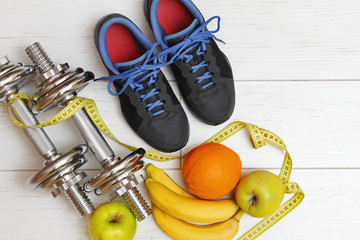Exercise builds cardiovascular endurance and muscle strength and improves flexibility. It also reduces the risk for certain heart diseases and can help manage other health conditions.
Fueling your body with a proper mix of carbohydrates, protein and fats is essential for optimal performance during workouts. Proper post-workout nutrition helps your body recover from workouts and build stronger muscles.
The foods we consume serve as the fuel for our bodies, allowing us to work out longer and harder and achieve our fitness goals. Eating a well-balanced diet of carbohydrates, proteins and fats, in addition to adequate fluids is essential for maintaining healthy body weight, building muscle and reducing fat, as well as optimizing performance during exercise.
Using the highest quality fuel is just as important for your body as it is for your car. The vitamins, minerals and antioxidants found in whole, wholesome foods nourish every cell in the body to help you work out harder, longer and reach your fitness goals faster.
The President’s Council on Sports, Fitness & Nutrition works to increase national awareness of the value of regular physical activity and a balanced diet in helping people maintain their health. This is achieved by encouraging the public to participate in a variety of physically active, fun activities such as swimming, cycling, jogging and walking while eating nutritious meals and snacks. Regular exercise offers many benefits including: weight management, increased strength and endurance, improved mental health, and improved cardiovascular fitness, which can reduce the risk of heart disease. The combination of a healthy diet and exercise is the best way to achieve and maintain a healthier lifestyle.
Exercise
Fitness is a broader term than just physical activity, and it encompasses your health-related goals and personal definition of “fitness.” While you may have specific exercise and wellness goals in mind, it’s important to take a holistic approach to overall health. This includes nutrition, exercise, sleep, and stress management.
While there is no one-size-fits-all fitness goal, a commonly cited peer-reviewed research paper defines fitness as the ability to perform daily tasks with vigor and alertness without undue fatigue. This is accomplished by having a healthy body composition, cardiorespiratory endurance, muscular strength, flexibility, and balance.
Regular physical activity helps you meet these fitness goals, but it’s important to choose activities that are appropriate for your age and fitness level. According to the Centers for Disease Control and Prevention, you should aim to engage in at least 150 minutes of moderate-intensity physical activity or 75 minutes of vigorous-intensity physical activity per week. Exercise can be anything that gets your heart pumping and blood flowing, such as brisk walking, dancing, riding a bike, swimming, jogging, or participating in a fitness class.
Muscle-strengthening exercises, like weight training and resistance bands, as well as stretching exercises, such as yoga or tai chi, also count toward your weekly exercise time. Aim to include exercises that work all the different parts of your body, including your core, which is the muscle group around your midsection. Choosing enjoyable activities is also key, as you’re more likely to stick with a workout routine if you enjoy the experience.
Exercise can also improve your mood and decrease feelings of depression, anxiety, and stress. It increases the production of feel-good hormones, which can boost your self-esteem and make you happier.
Finding ways to fit exercise into your life can be challenging, but there are many options. Try to find an exercise that is fun or exciting, and consider exercising with a friend. This can stoke your motivation, inspire you to try new things, and keep you consistent. If going to the gym isn’t possible, doing workouts at home can be an excellent alternative. You can even use a smartphone app to help you stay on track and reach your fitness goals.
Sleep
Sleep is a critical part of the body’s restorative process. It promotes muscle growth and repair, helps the immune system fight off disease and keeps the brain sharp. It’s also important for our mental health, affecting everything from mood and memory to creativity and decision making. And if you want to be at your best in the gym or on the field, you need good quality sleep.
In some ways, modern science’s understanding of the complex functions of sleep is like a partially assembled jigsaw puzzle. Experts can see some of the pieces and even know how they fit together, but they haven’t fully figured out all the connections.
But we do know that some of the key processes of sleep involve the release and use of nutrients in the body. For example, protein builds muscles, and during sleep, cells throughout the body save energy by powering down and using stored proteins for fuel. This allows them to resupply themselves for the next day’s activities, and it makes sure that you have enough energy to get through the day.
That’s why it’s so important to eat a healthy diet, including adequate amounts of protein. It’s also why you need to be physically active – exercise enhances the quality of your sleep by circulating drowsiness-inducing chemicals in the brain, and it helps you reach and maintain a healthy weight.
This study was a scoping review that examined 61 articles that showcased the relationship between nutrition, PA and sleep quality. Research was conducted in a variety of electronic libraries and databases, such as Saudi Digital Library (SDL), PubMed, Google Scholar, and ScienceDirect. Articles were chosen by examining their titles, abstracts and full text. This was done in order to identify, collect and map the available data on the topic. This literature review helped to identify the gaps and limitations of the existing knowledge regarding the relationship between these three dimensions. It provides new avenues for future quantitative studies aimed at determining the exact impact of each on the other.
Stress Management
Stress is an inevitable part of life, but chronically high levels can be a real health threat. It has been linked to cardiovascular problems, digestive issues and a weakened immune system. In addition to getting adequate sleep and eating well, exercise is one of the most effective ways to combat stress.
Many studies on the effects of exercise for stress relief have focused on aerobic exercise such as walking, jogging, dancing and biking, but yoga, pilates, tai chi and resistance training can also be great options. For stress relief, the Centers for Disease Control and Prevention recommends at least 150 minutes of moderate exercise per week. If time is an issue, breaking up the workout into three 10-minute sessions a day can be just as beneficial.
During exercise, the body releases feel-good chemicals called endorphins. These help to counteract the negative effects of stress hormones on the brain, which can lead to feelings of anxiety, depression and a bad mood. Exercise also improves sleep quality, helps to regulate hormonal balance and relaxes the muscles, all of which can contribute to stress reduction.
The root causes of stress are complex, and it is important to gain insight into the things that trigger your stress and to work toward addressing them. It is also helpful to practice constructive coping mechanisms, such as exercise, journaling and meditating. These can replace unhealthy coping strategies like overindulging in food or alcohol, which only make stress worse.
Achieving a healthy, balanced diet and regular exercise are the best ways to fight stress, but it is also important to recognize what your individual stressors are and how you react to them. You can also talk to a professional for additional support.
The CDC’s Health Benefits of Physical Activity guide offers some general recommendations for how much exercise you should get, but you should always talk to your doctor before starting a new exercise program to ensure that it is safe for your condition and fitness level. They can help you develop a safe and effective routine that takes your specific needs into account.
